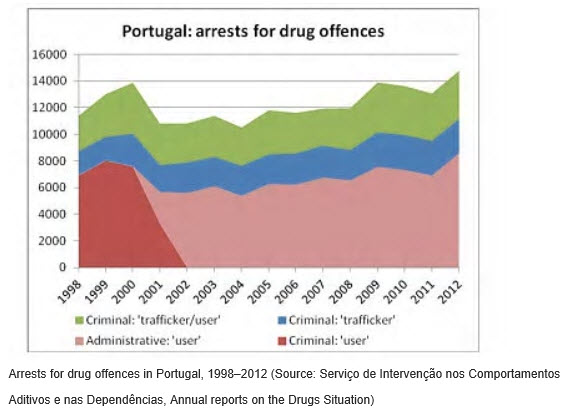Do we really want Portugal’s drug laws?
 The Spectator 18 June 2017
The Spectator 18 June 2017
Family First Comment: A very interesting analysis that you won’t hear from the Drug Foundation…
“The pro-drug lobby likes to quote Portugal at us not because it wants Britain to copy what Portugal has done but because it counts on us not knowing what actually happens to drug-users in Portugal and hopes that we will confuse the words ‘decriminalised’ with ‘made legal’. The latter is what metropolitan liberals really want, not because they are especially concerned with the health of drug addicts on distant council estates but because they rather like using drugs themselves.”
And note from the graph that arrests for drug offences have INCREASED! (despite the Drug Foundation saying that “it’s a health issue, not a criminal issue”)
‘The war on drugs has failed,’ asserted Shirley Cramer, chief executive of the Royal Society for Public health in the latest propaganda coup for the pro-drug lobby. Her society, along with the Faculty of Public Health, have parroted the familiar call among metropolitan liberals for drugs to be decriminalised. Their argument is that we should drop our punitive approach to drugs and be more like Portugal, which decriminalised drugs in 2001 and now, it claims, has fewer deaths from drug use that.
There are a couple of problems with this. Firstly, drug decriminalisation in Portugal is only a success if you cherry-pick your statistics carefully. If you want to make the opposite argument you can pick a few which work in the other direction – such as pointing out that there has been 40 per cent increase in homicides related to drugs, and that HIV infection related to intravenous drug use were by 2005 the third highest in Europe.
But there is another rather fundamental problem with the Royal Society for Public Health’s argument. Britain only has a punitive drugs policy in theory. In practice, we have a softer attitude even than decriminalised Portugal. Theoretically, you can get a 7-year sentence for possession of class A drugs like heroin and crack cocaine, and five years for possession of a class B drug like cannabis. Yet in practice, British drug users can, by and large, snort and smoke with impunity. A freedom of information request in 2011 revealed that only 554 people were in jail for drug possession, and a further 3501 for possession with intent to supply. Even Harry Hendron, the barrister recently convicted of supplying drugs which killed his 18-year-old Columbian boyfriend has not been sent to jail, but was given a community sentence instead.
Get hooked on opiates, and the British state will even fix you up with methadone for free. There are now 140,000 state-sponsored methadone users, each of them costing taxpayers £3,000 a year. Is that really a ‘punitive’ policy?
British drug-users wouldn’t like the Portuguese regime – where, contrary to what some try to imply, drugs remain illegal. Those caught with drugs are hauled before a ‘commission for the dissuasion of drug addiction’. They may not get a criminal record but they can be fined, placed on a compulsory treatment programme, or even have their passport confiscated. I only wish we used such firm measures.
The pro-drug lobby likes to quote Portugal at us not because it wants Britain to copy what Portugal has done but because it counts on us not knowing what actually happens to drug-users in Portugal and hopes that, like the Times headline did on Thursday, we will confuse the words ‘decriminalised’ with ‘made legal’. The latter is what metropolitan liberals really want, not because they are especially concerned with the health of drug addicts on distant council estates but because they rather like using drugs themselves.
https://blogs.spectator.co.uk/2016/06/really-want-portugals-drug-laws/#
Decriminalisation Of Drugs In Portugal Was Not A Success, Says Dr Manuel Pinto Coelho
Huffington Post 10 Dec 2012
…despite his country’s policies being lauded, Dr Manuel Pinto Coelho, President of the Association for a Drug Free Portugal, says decriminalisation has not worked. “Decriminalisation in Portugal was not a blessing. Decriminalisation didn’t help us. It was decriminalisation that results like this? I don’t know. It makes no sense that people say since decriminalisation drugs use fell in Portugal,” he told The Huffington Post UK, citing statistics from the White House which show an increase in drug related deaths between 2004-2006 in the country. Dr Pinto Coelho argues that viewing drug attacks as sick means the line between dealers and consumers is blurred. “There is now in Portugal a trivialisation. It is more trivial then it was before. I’m not happy with this,” he said.
“I don’t believe a society where people have addiction is part of life. There are people who are happy in the system, I believe in the treatment in the drug dependents and that it is possible to put a final part in their addiction. I believe that every system, every policy system, should have a final goal; life without drugs. I believe they can reach a life without drugs, I believe we have always to have to fight against cancer and poverty and unhappiness and hunger and drugs.” According to statistics compiled by the European Monitoring Centre for Drugs and Drug Addiction (EMCDDA) between 2001-07, after decriminalisation, more people took cannabis, cocaine, amphetamines, ecstasy, and LSD – but decreased in neighbouring Spain between 2003-2008. “Kofi Annan said a very interesting thing – the eradication of drugs in our planet is a difficult task but we can go forward, we can go through it. Since decriminalisation in Portugal there was an increase in every single drug. In cannabis and cocaine and ecstasy and in HIV aids,” he said.
READ MORE: http://www.huffingtonpost.co.uk/2012/12/10/portugal-decriminalisation-drugs-britain_n_2270789.html






